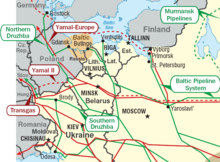Baltic Pipeline System
| Baltic Pipeline System | |
|---|---|
 Location of Baltic Pipeline System | |
| Location | |
| Country | Russia |
| General direction | south-north-west |
| From | Yaroslavl |
| Passes through | Kirishi |
| To | Primorsk |
| Runs alongside | Sever Pipeline |
| General information | |
| Type | Oil |
| Operator | Transneft |
| Commissioned | 2001 |
| Technical information | |
| Maximum discharge | 76.5 million tons per year |
The Baltic Pipeline System (BPS) is a Russian oil transport system operated by the oil pipeline company Transneft. The BPS transports oil from the Timan-Pechora region, West Siberia and Urals-Volga regions to Primorsk oil terminal at the eastern part of the Gulf of Finland.
History[]
The project started in 1997 and construction was completed in December 2001. In April 2006 the Baltic Pipeline System reached full design capacity.[1]
Technical features[]
Main elements of the BPS-1 are:
- Yaroslavl-Kirishi pipeline
- Kirishi pumping station
- Kirishi-Primorsk pipeline
- Oil terminal in Primorsk.[2]
The capacity of the BPS-1 is 76.5 million tons of oil per year.[1]
Controversy[]
During planning and construction stages the project was criticized by environmentalists, mainly because of the Baltic Sea's status as a particularly sensitive sea area and Primorsk’s proximity to the Beryozovye Islands nature reserve, a major bird sanctuary protected by the Ramsar Convention.[3]
BPS-2[]
The Baltic Pipeline System-2 (BPS-2) is a second trunk line of the system running from the Unecha junction of the Druzhba pipeline near the Russia-Belarus border to the Ust-Luga terminal on the Gulf of Finland with a 172 kilometres (107 mi) long branch line to the Kirishi oil refinery. The construction of the BPS-2 started on 10 June 2009[4] and it entered in function in late March 2012.[5]
See also[]
References[]
- ^ a b "Baltic Pipeline System Set To Reduce Transit Dependency". St. Petersburg Times. 2006-04-11. Retrieved 2007-12-29.
- ^ "The Baltic Pipeline System – the key federal project in the Leningrad Region". Leningrad Oblast Administration. Archived from the original on 2012-12-22. Retrieved 2007-12-29.
- ^ Sergei Grivenkov (December 2000). "What impact will a new port in the Baltic have on the environment?". Journal Evropa. Archived from the original on 2008-05-31. Retrieved 2007-12-29.
- ^ "Russia builds Baltic oil pipeline to bypass Belarus". EurActiv. 2009-06-11. Retrieved 2009-06-30.
- ^ "Czech concerns over the future of the Druzhba oil pipeline". 18 April 2012.
External links[]
- Energy infrastructure completed in 2001
- Oil pipelines in Russia

